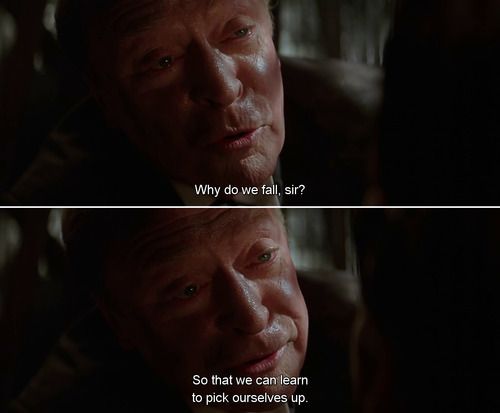It might seem as if the journey towards self-knowledge could proceed in a relatively smooth and linear way. But the battle between the forces of repression and the drive towards self-awareness tends to be far more bitter and entrenched than that. For years, there can be stalemate, neither side yielding ground until the pressure to know grows intolerable and bursts forth in a spectacular explosion like a trapped subterranean gas. Insofar as we learn about ourselves, it seems that we tend to do so in dramatic crises and breakdowns, rather than (as would be more convenient) peaceful small daily epiphanies.
For a long time, we pretend to ourselves and others that all is well. We twitch occasionally, sometimes we are a lot more irritable than seems right but we keep busy and wave away concerns. We keep showing up and being a good boy or girl, the way we’ve been trained to do.
Until, suddenly, one day, much to everyone’s surprise, including our own, we might break. The rupture can take many forms. We can no longer get out of bed. We fall into a catatonic despair. We develop all-consuming social anxiety. We refuse to eat. We babble incoherently. We lose command over part of our body. We are compelled to do something scandalous contrary to our normal selves. We become wholly paranoid in a given area. We refuse to play by the usual rules in our relationship, we have an affair, ramp up the fighting – or otherwise poke a very large stick in the wheels of day to day life.
The breakdown looks like madness, but it doesn’t have to be random or senseless. It may be a bid for self-understanding; an attempt by one part of our minds to force the other into a process of growth, self-understanding and self-development which it has hitherto refused to undertake. If we can put it paradoxically, it may be an attempt to jumpstart a process of getting well, properly well, through a stage of falling very ill.
The danger, therefore, if we merely medicalise a breakdown and attempt to shift it away at once is that we will miss the lesson embedded within our sicknesses. A breakdown isn’t just a pain, though it is that too of course; it is a particular opportunity to learn.
The reason we break down is that we have not, over years, flexed very much. There were things we needed to hear inside our minds that we deftly put to one side, there were messages we needed to heed, bits of emotional learning and communicating we didn’t do – and now, after being patient for so long, far too long, the emotional self is attempting to make itself heard in the only way it now knows how. It has become entirely desperate – and we should understand and even sympathise with its mute rage. What the breakdown is telling us above anything else is that it must no longer be business as usual that things have to change or (and this can be properly frightening to witness) that death might be preferable.
Why can’t we simply listen to the emotional need calmly and in good time – and avoid the melodrama of a breakdown? Because the conscious mind is inherently lazy and squeamish and therefore reluctant to engage with what the breakdown eventually has to tell it with brutality.
A crisis represents an appetite for growth that hasn’t until now found another way of expressing itself. Many people, after a horrific few months or years of breakdown, will say: ‘I don’t know how I’d ever have gotten well if I hadn’t fallen ill’.
In the midst of a breakdown, we often wonder whether we have gone mad. We’re behaving oddly no doubt, but beneath the surface agitation, we are on a hidden yet logical search for health. We haven’t become ill; we were ill already. Our crisis, if we can get through it, comprises an attempt to dislodge us from a toxic status quo and an insistent call to rebuild our lives on a more authentic and sincere basis.
Credits: https://theschooloflife.com/
